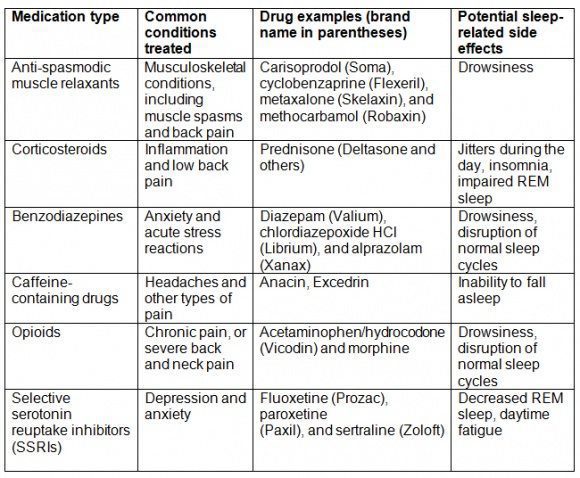El Paso, TX. Chiropractor Dr. Alex Jimenez looks at back pain medications and their effect on sleep.
Can you relieve spine pain and get a good night’s rest? Sure some drugs get in the way.
Prescription medications are among the most recommended nonsurgical treatments for back and neck pain. While these drugs might help alleviate what ails your back, your sleep may suffer because of this. That’s a big deal, as sleep deprivation hurts your general wellbeing.
Unfortunately, back and neck pain medications can have side effects—and interfering with your sleep and ability to operate normally throughout the day are ones that are typical. Your medication may stop you from getting enough sleep or falling asleep. Or, your slumber quality suffers, although you might doze off readily. Plus, sleep-related side effects do n’t just affect you during the nighttime hours, as you may experience drowsiness or jitters during the day.
Table of Contents
Sleep Science 101: Reconsidering Sedatives
Before delving into common back and neck pain drugs that may affect your slumber, it’s important to comprehend one of the biggest misconceptions about sleep medicines: the effect of sedation.
Many view sedatives as sleep aids due to the fact that they enable you to fall asleep fast. Nevertheless, this doesn’t tell the entire image, based on Steven A. King, MD, MS, who practices pain medicine in New York and is a clinical professor of Psychiatry at the New York University School of Medicine.
“When contemplating what’s good for sleep, it really is vital to not forget that sleep is just not a uniform activity through the entire span of the night, but rather, a succession of cycles involving different levels of wakefulness,” wrote Dr. King in a site for Psychiatric Times. “Merely because a medication may put one to sleep doesn’t mean restful slumber will be provided by it if it disrupts the normal sleep cycles.”
During a good night’s sleep, your brain will repeatedly cycle through five phases: stages 1, 2, 3, 4, and rapid eye movement (REM) sleep. You should spend about 25% of your total slumber and this is the cycle. As researchers believe it contributes to regulating your mood, learning, and saving memories having uninterrupted REM sleep is significant.
Monitor your sleep quality, if you’ve been prescribed a medicine with sedative effects, for example an opioid. It’s not about how fast you fall asleep but also how refreshed you feel the very next day. If you dazed and ’re waking up groggy, talk to your doctor about possible alterations to your medication regimen.
Back & Neck Pain Medications That May Disrupt Sleep
Below are drugs that treat spinal conditions and may likewise have sleep-associated side effects.
Note: The table below features common back and neck pain medications that could interfere with your sleep and daytime functioning; it is not an all inclusive list. Always discuss the potential side effects of your medications that are certain with your physician.

Talk To Your Doctor About Drug Alternatives For Better Sleep
The quality of your slumber shouldn’t suffer as a result, although keeping your spine healthy is vital. If you’ve detected a decrease in quality or quantity of sleep since beginning your back or neck pain medicine, tell your physician. She or he might prescribe an alternative drug or treatment while addressing your spinal issue to restore healthful sleep.

Post Disclaimer
Professional Scope of Practice *
The information on this blog site is not intended to replace a one-on-one relationship with a qualified healthcare professional or licensed physician and is not medical advice. We encourage you to make healthcare decisions based on your research and partnership with a qualified healthcare professional.
Blog Information & Scope Discussions
Welcome to El Paso's Premier Wellness and Injury Care Clinic & Wellness Blog, where Dr. Alex Jimenez, DC, FNP-C, a board-certified Family Practice Nurse Practitioner (FNP-BC) and Chiropractor (DC), presents insights on how our team is dedicated to holistic healing and personalized care. Our practice aligns with evidence-based treatment protocols inspired by integrative medicine principles, similar to those found on this site and our family practice-based chiromed.com site, focusing on restoring health naturally for patients of all ages.
Our areas of chiropractic practice include Wellness & Nutrition, Chronic Pain, Personal Injury, Auto Accident Care, Work Injuries, Back Injury, Low Back Pain, Neck Pain, Migraine Headaches, Sports Injuries, Severe Sciatica, Scoliosis, Complex Herniated Discs, Fibromyalgia, Chronic Pain, Complex Injuries, Stress Management, Functional Medicine Treatments, and in-scope care protocols.
Our information scope is limited to chiropractic, musculoskeletal, physical medicine, wellness, contributing etiological viscerosomatic disturbances within clinical presentations, associated somato-visceral reflex clinical dynamics, subluxation complexes, sensitive health issues, and functional medicine articles, topics, and discussions.
We provide and present clinical collaboration with specialists from various disciplines. Each specialist is governed by their professional scope of practice and their jurisdiction of licensure. We use functional health & wellness protocols to treat and support care for the injuries or disorders of the musculoskeletal system.
Our videos, posts, topics, subjects, and insights cover clinical matters and issues that relate to and directly or indirectly support our clinical scope of practice.*
Our office has made a reasonable effort to provide supportive citations and has identified relevant research studies that support our posts. We provide copies of supporting research studies available to regulatory boards and the public upon request.
We understand that we cover matters that require an additional explanation of how they may assist in a particular care plan or treatment protocol; therefore, to discuss the subject matter above further, please feel free to ask Dr. Alex Jimenez, DC, APRN, FNP-BC, or contact us at 915-850-0900.
We are here to help you and your family.
Blessings
Dr. Alex Jimenez DC, MSACP, APRN, FNP-BC*, CCST, IFMCP, CFMP, ATN
email: coach@elpasofunctionalmedicine.com
Licensed as a Doctor of Chiropractic (DC) in Texas & New Mexico*
Texas DC License # TX5807
New Mexico DC License # NM-DC2182
Licensed as a Registered Nurse (RN*) in Texas & Multistate
Texas RN License # 1191402
ANCC FNP-BC: Board Certified Nurse Practitioner*
Compact Status: Multi-State License: Authorized to Practice in 40 States*
Graduate with Honors: ICHS: MSN-FNP (Family Nurse Practitioner Program)
Degree Granted. Master's in Family Practice MSN Diploma (Cum Laude)
Dr. Alex Jimenez, DC, APRN, FNP-BC*, CFMP, IFMCP, ATN, CCST
My Digital Business Card


